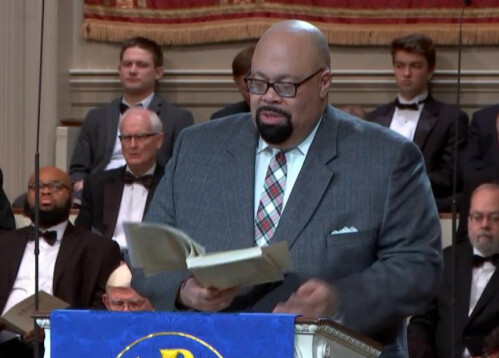
March 30, 2021 marks the one-year anniversary of Tim Russell’s hospitalization and death from COVID-19. I’ve been asked to convey some pastoral thoughts which typically means, “Say something comforting.” While I always desire your comfort, I think it would be best to share honestly how the Lord has had to comfort me with the same gospel I offer you.
After the death of his wife, C.S. Lewis published a journal of his mourning called A Grief Observed. It’s poignant, honest, raw, and very helpful. Similarly, by opening their grief to us, the psalmists teach us how to lament. They teach us that experiencing the Father’s comfort requires climbing into his arms through lament. While leading worship, Tim often urged us to “make a good confession.” I want to urge us to make a good lament.
In the psalms, we observe a good lament begins by recounting our painful story to the Lord. Of course he knows it already, but healing requires that we voluntarily expose our wounds to the Father of mercies. My lament begins something like this, “O Lord, those were nine Calvary-like dark days!
Tim and Kathe had just returned from New York to celebrate the birthday of a very old friend. New Yorkers were beginning to contract the mysterious virus, but it still seemed a remote issue to us. Tim returned with what seemed like a bad chest cold, so he jumped right back into his ministry here, including joining a large group of us planning for Holy Week services.
Within a few days he couldn’t walk. Within a few more days he was battling the neurological and respiratory effects of COVID. And within a few more days he was in the arms of your Jesus he knew so well. Why, Lord! Why did he have to contract it? Why did he have to be among the first to die in Memphis?”
Lewis said, "The death of a beloved is an amputation.” Tim’s death has been excruciatingly painful for Jackie and me, as it has been for many of you. And even those descriptive words can’t capture what it is like for Kathe. Many a night, we have cried ourselves to sleep. Certain places can still trigger amputation-like pain. For weeks I couldn’t go back into the conference room where I last saw him. And I’ve yet to go into his office, neither the old or newer one. Neither am I ready to eat at Cozy Corner.
Even patriarchs, prophets, and our Lord let out “great and grievous lamentation” (Ge. 50:10), "cried with a loud voice” (2 Sa. 19:4), and were “deeply moved in spirit and greatly troubled (Jn. 11:33). Paul did not prohibit grieving, he just told us not to “mourn as those who have no hope” (1 Th. 4:13). Recalling and rawly expressing grief to the Lord is not unbelief, it is the first step of hope.
As only a sovereignly gracious Father could do, the God of all comfort ironically uses the spiritual discipline of lament to deepen our faith in the hope of the gospel. Lewis said, "You never know how much you really believe anything until its truth or falsehood becomes a matter of life and death to you.”
The painful recollection of Tim’s final days forces us to recall the miraculous preservation of his faith. Though like Jonah, he literally felt like he was drowning, he confessed, “Salvation belongs to the Lord” (Jonah 2:9). Like Job, he trusted the Lord who it seemed was “slaying” him (Job 13:15). Counterintuitively to his physical and mental experience, he was able to exclaim with the psalmist, “He will judge the world with righteousness, and the peoples with equity” (Ps. 98:9). “Through his faith, though he died, he still speaks”(He. 11:4) assuring us the gospel is a foundation to life deeper than experience and as long lasting as eternity.
The way Tim died is not an example for us to follow as much as it is a testimony to the supernatural keeping power of Jesus’ love. That shield of faith by which God preserved Tim from apostasy forces us to look back to the many things we heard him say and do as God was preparing him for that last battle. His commitment to morning and evening worship, his love for “joining Jesus already at prayer,” his making a “good confession of his sin,” his singing hymns from memory, and his boldness in alerting us to the gracious character of Christ by shouting, “That’s the Jesus I know!” were not pietistic displays, but evidences of God’s making him fit through the means of grace to finish well.
This past Sunday, just before entering the pulpit, I snugged up the laces on my shoes and chuckled at the sight of my socks. I bought them at a store in London Tim liked. Whenever I wore them, Tim said, “Nice stockings, Pastor!” He said many funny things. Recall those, too, and laugh with one who “laughed at the future” (Pr. 31:25). You’re not dishonoring Tim because he is more joyful than ever! Tim was in our home many times, mostly by his own invitation as my family’s CC pastor. He would call and ask “when" (not "if") would be the most “opportune" (not “convenient") time to come by and pray a blessing over every member of the family, “especially the children.”
May you hear from Tim’s life what we last heard from his lips, “The Lord bless you and keep you.” While Tim was alive, the Russells had one name, “Tim and Kathe.” Mercifully for us, albeit painful for her, the Lord has left Kathe with us, so she will have the last word of this article. When Tim passed away, Kathe posted, “Tim has seen the face of God. Be at peace, my love.”
The T. Russell Seminarian Support Fund
The T. Russell Seminarian Support Fund was established by the Second Presbyterian Church Foundation in memory of Reverend Timothy Lowell Russell (1957-2020). Learn more about the fund and donate here.

